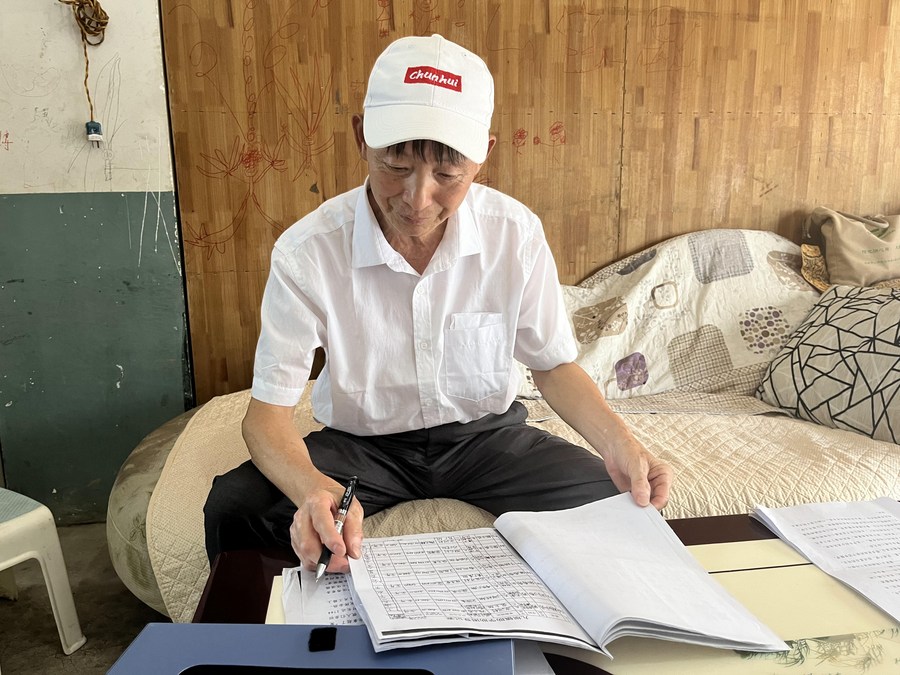
This photo taken with a mobile phone shows Huang Jinlong arranging records of students whom he has helped in Jiuba Town of Zunyi, southwest China's Guizhou Province, Aug. 24, 2022. (Xinhua/Li Jingya)
For more than 30 years, Huang Jinlong, a rural teacher in southwest China's Guizhou Province, has been dedicated to helping students in need to finish their schooling.
Teaching in Jiuba Town, located in a remote mountainous area administered by Zunyi City, Huang, 73, has donated part of his salary and has been raising money, assisting more than 1,500 impoverished students in their pursuit of education.
Huang remembers an early autumn night 35 years ago, when the mother of Cheng Qingjiang, a third-grade student at Pujia Primary School, came to his home and asked for help because she could not afford her son's tuition.
Huang, then a teacher at the school, told the mother without hesitation, "Let the child come to school tomorrow."
At that time in the mountainous area of Guizhou, which once had the largest poverty-stricken population at the provincial level, there were many children like Cheng who could not afford to go to school.
Despite the fact that he was the only breadwinner in his family of seven, Huang began using part of his meager salary to support Cheng and his sister, a first-grader in primary school, until they finished college and vocational high school.
Huang also supplied tuition fees to other students who couldn't afford them. In the spring semester of 1998, he spent nearly 5,000 yuan (about 727.65 U.S. dollars) on these students, equivalent to his annual salary at the time.
Meanwhile, he decided to look for help to fund more students' schooling.
Through written proposals and letters, Huang called on society to help children in distress change their fate. He visited the families of poor students in the mountains and sent the details of their actual situations all over the country, inviting caring people to visit the mountainous area.
Thanks to Huang's efforts, in the autumn of 1997, several people from Zunyi came to visit Pujia Primary School, selecting 43 poor students to become long-term aid recipients.
"At the time, I was so excited that I cried. My efforts were not in vain," Huang said.
Huang also walked the streets of Tongzi County, which administers Jiuba Town, persuading both people he knew and those he didn't know to help his needy students.
"He is careful and bold," said Cheng Bulian, then principal of Pujia Primary School. "And he can bear hardships that ordinary people cannot."
Huang retired in 2006, but he never stopped caring for his students.
In April 2014, local officials of Jiuba Town came to Shuihe Village and Lianhe Village, offering one-on-one assistance to finance poverty-stricken students' schooling, according to a list provided by Huang.
Later, more than 20 volunteer service organizations from inside and outside of Guizhou, as well as more than 100 people from over 30 cities, joined Huang's volunteer service team to help the families of students in need.
China achieved the feat of removing all remaining counties from the country's poverty list after an announcement in November 2020 that the last nine impoverished counties -- all in Guizhou Province -- had eliminated absolute poverty.
In 2022, the per capita disposable income of urban residents in Tongzi County was 38,270 yuan, and 16,790 yuan for rural residents. The county will comprehensively promote rural revitalization this year, aiming to increase the per capita net income of those lifted out of poverty by more than 16 percent, according to the county's government work report for 2023.
The local governments in Guizhou have also increased their investment in education. The provincial department of finance has allocated nearly 15 million yuan for student aid and subsidies in Tongzi County this year to promote the balanced development of education in urban and rural areas.
Data shows that the retention rate in nine-year compulsory education, which includes six years of primary school and three years of junior secondary school, in Tongzi County has topped 103 percent, while the gross enrollment rate of high schools has reached almost 94 percent.
The Pujia Primary School, where Huang taught, has 375 students, none of whom have dropped out of their education.
Huang is still busy, despite his age. He has extended his help to the outlying townships in his home county and to the poverty alleviation relocation communities in Tongzi County.
His family, despite occasional complaints, has supported his acts of kindness.
"My son often drove around to inform good-hearted people of meetings or to help me deliver donations. My wife didn't understand at first, but later she was very supportive," Huang said.
Many students who grew up with his help have followed in his footsteps. Cheng Qingjiang, who works in Zunyi, and Yao Zhengchao, who lives in Guiyang, capital of Guizhou, have each sponsored a student. He Jinlong donated 10,000 yuan on New Year's Day last year and asked Huang to distribute it to students in need.
Over the decades, Huang has raised donations exceeding a total of 2.8 million yuan, enabling more than 1,500 students from impoverished families to complete their studies and realize their dreams. Over 400 of these students have finished their college education and another 100 are now studying at colleges.
At the end of 2022, Huang won the title of "Guizhou Man of the New Era" due to his decades of selfless support for students in need.
Since March this year, Huang has organized a volunteer team to deliver donations to schools and children with disabilities, and go to schools to educate students about juvenile law.
"I will continue to devote my spare time to caring for the next generation. I hope to do my best to inspire people around me to spread love and help more people in need," Huang said.